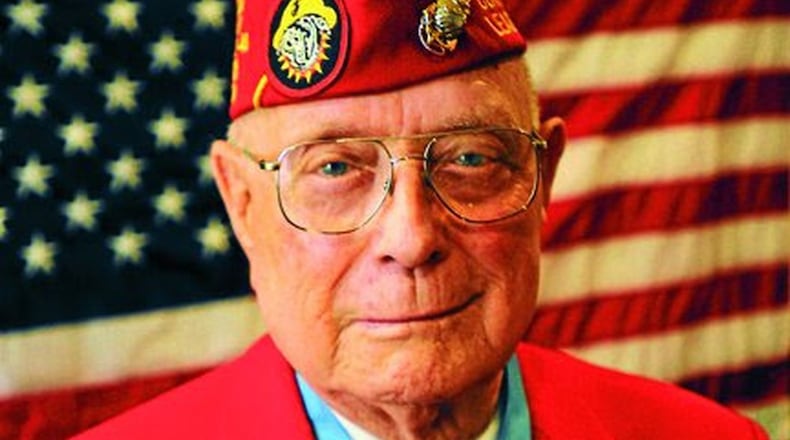It was, he said, a “traumatic experience,” as was the loss of a boyhood friend who died in the war. And it sowed the beginning of what the sole-surviving Marine Corps Medal of Honor recipient in World War II would start decades later: Monuments across the country dedicated to the families left behind.
RELATED: Gold Star families lean on each other
Williams was among those expected at a ceremonial ground-breaking Thursday, Sept. 28, at the National Museum of the U.S. Air Force for a future Gold Star Family Memorial Monument in the outdoor memorial park.
“We thought the museum would be an ideal place because of the vast number of people that visit,” the 93-year-old veteran said in a telephone interview. “… The Gold Star Memorial Monument recognizes the families of all of those who sacrificed their lives in the Armed Forces at any time in our history.”
By next week, 25 monuments across the country will be in existence when the newest is unveiled in Bay City, Mich, said Chad Graham, who is Williams’ grandson and president and director of operations of the Louisville, Ky.-based nonprofit, the Hershel “Woody” Williams Medal of Honor Foundation. The family launched the foundation, which also offers college scholarships to children of Gold Star families, in 2010.
Working with communities and organizations across the country, the foundation intends to add monuments in every state in the nation. The first was in Williams’ home state of West Virginia. Williams “took a step back and said, ‘OK guys, this is the first one and we need to get one in every state … because these families honestly exist everywhere,’” Graham said.
RELATED: Pearl Harbor survivor; ‘I thought this was going to be my last day’
The memorials have been erected or are planned in 37 states, thus far.
“The country began recognizing Gold Star mothers around the country, but no one ever used the term Gold Star dad,” said Williams, a retired VA counselor who lives in Ona, W.V. “We never did know why (it didn’t), but dad was part of this loss as well as the rest of the family. The brothers and sisters and aunts and uncles and grandmas and grandpas — all those people grieve when they lose a loved one.
“That’s how it all got started and I felt we needed to recognize and pay tribute to those people,” he said.
At the museum, about $10,000 out of a goal of $40,000 has been raised, said Matthew J. Previts, a volunteer working on the project. The goal is to dedicate the memorial by next spring.
RELATED: WWII 75 years later: 101-year-old Dayton native relives Doolittle Raid
About Hershel Williams
In October 1945, President Harry S. Truman recognized Williams with the Medal of Honor for the Marine corporal’s resistance against the Japanese military in the Battle of Iwo Jima. When tank crews failed to open a pathway for infantry forces against concrete pillboxes, buried mines and volcanic sands, Williams “daringly went forward alone to attempt the reduction of the devastating machinegun fire from the unyielding positions,” a citation said. Covered by four riflemen and facing enemy small arms fire, the Marine fought for four hours preparing demolition charges and using flamethrowers to “wipe out (one) position after another, the citation said.
About the Author
